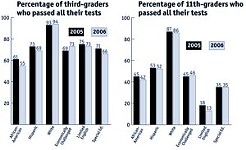AISD Students Fare Well in NAEP Results
Austin fourth- and eighth-graders out-performed the nation in math and peer urban districts in reading
By Rachel Proctor May, Fri., Dec. 9, 2005
The scores were released as part of the Trial Urban District Assessment, which compared Austin's NAEP scores to those in other urban districts and the nation as a whole. Of 11 districts in the TUDA, only Charlotte, N.C., performed better than Austin. In math, Austin fourth-graders beat the national average by five points and other large cities by 14 points, while eighth-graders exceeded the national average by three points and their urban peers by 16 points. AISD students didn't beat the national average in reading, but they did beat their urban peers by 11 points in fourth grade and seven points in eighth grade.
Averages, however, can conceal as much as they reveal. The reasoning behind a separate assessment for urban areas is that cities have higher percentages of poor and minority students, who typically fare worse on standardized tests. This is certainly true in AISD, where white students' scores averaged about 10 to 20% higher than those of black and Hispanic students.
The demographic profiles of urban districts themselves vary significantly, however. Unlike many cities, Austin still has many middle-class families and pockets of wealthy students who drive up average scores. Only about 60% of its students are considered poor, while most assessed districts had many more – in Cleveland, for example, a tragic 100% of public school students are poor. Still, even when broken down by race and income, the data shows Austin students typically holding their own or outperforming their peers – Hispanic fourth-graders got better math scores than other Hispanic fourth-graders, for example, and African-American eighth-grade math students beat others of their demographic.
While this fact speaks to AISD's curriculum and management, to Ed Fuller, a professor of education at UT, it also shows the importance of maintaining a socioeconomically diverse student body. "Austin has advantages because it's not all poor and minority," he said. However, "the district still has such large achievement gaps and that's what bothers me."
Got something to say on the subject? Send a letter to the editor.








